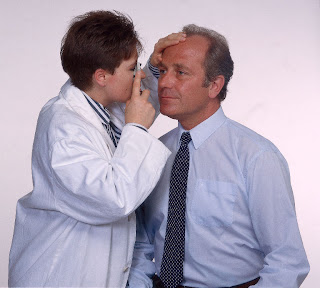As you age, the elderly will experience a decrease in visual acuity. Fortunately, researchers found vitamin D can overcome these problems in the elderly. In addition, vitamin D is also useful to improve fitness and Alzheimer's block.
British researchers found vitamin D supplements could potentially be a simple and effective way to cope with aging eye diseases like macular degeneration.

Macular degeneration is a condition in which the macula (the center of the retina and into the retina of the most important) decline resulting in decreased visual acuity and can cause loss of vision.
The study used mice to demonstrate the effect of vitamin D has been seen in just six weeks. Scientists believe many people in developed countries vitamin D deficiency is thought to be important in maintaining the flow of blood supply to the retina.
Professor Jeffrey Glen of the Institute of Ophthalmology at University College London, who led the research explains the small blood vessels that supply blood to the retina is blocked by small molecules over time, causing inflammation.
"In humans, this can lead to decrease in the number of cells in the recipient's eyes light up to 30 percent when aged 70 years and lead to decreased vision," said Prof. Jeffrey, as reported by The Telegraph, Wednesday (01/18/2012).
However, when one year old rats supplemented with vitamin D and injected with safflower oil containing 0.9 micrograms of vitamin D every three days, the accumulation of toxic molecules called beta amyloid is reduced. The mice were also increased vision capabilities.
The researchers found the idea after examining other findings that suggest that vitamin D may reduce the buildup of amyloid plaques in the brain. Stacking is known to be associated with the development of Alzheimer's disease.
Rats fed supplements also experienced a reduction of amyloid in blood vessels, such as aortic vessels. This suggests that vitamin D may also be useful to help prevent various health problems due to age, from reduced vision to heart disease.
"Although vitamin D is contained in some foods such as fish and egg yolks, 90 percent of vitamin D is produced by the skin with the help of sunlight. Many people do not get enough sunlight to produce adequate vitamin D," says Prof. Jefferey.
But Prof Jeffrey warned that researchers need to run clinical trials in humans before we say with confidence that the elderly should start taking supplements of vitamin D.
"It is important to remind people that this is just an experiment. Many people think to take vitamin supplements without consulting your doctor. Taking high doses of supplements can cause health problems," said Clara Eaglen from the RNIB.





